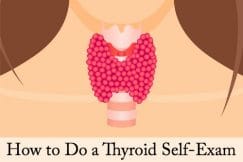Is breakfast is important for thyroid health? Or for health in general?
“Breakfast is the most important meal of the day.”
“Fasting through breakfast allows your body to more easily enter fat-burning mode.”
“Breakfast like a king, lunch like a prince, dinner like a pauper.”
“Eat a light breakfast to keep you from feeling bloated and heavy the rest of the day.”
The rhetoric around breakfast can be so confusing. Is it truly best to eat it or to simply skip it? And if you do eat it, what’s the best food to put on your plate?!
Here’s why I’m not a fan of breakfast-skipping…
Research indicates that habitually skipping breakfast is associated with cortisol (“stress hormone”) over-activity in the HPA axis. This can create widespread hormonal imbalance, because when one hormone becomes dominant, it throws off the proper production and balance of other related hormones.
Research has also shown that those who skipped breakfast were less likely to eat as nutrient-dense a diet as those who consumed breakfast. And breakfast-skippers were more likely to consume empty calories at night. Chronic stress was related to poor evening eating choices, whereas breakfast eaters did not appear to be affected by this type of chronic stress.
When one has hormone imbalance, waiting too long to eat can cause blood sugar to lower. When blood sugar lowers, cortisol goes up because the body feels it needs to manufacture its own energy.
High cortisol output, over time, may increase one’s risk for cardiometabolic disease, weight gain, lower thyroid hormones, and adrenal fatigue in some people.
My suggestion is to eat within one hour of waking up.
When we eat within an hour of waking, it signals to our body that we are not starving for food (eg. we are not allowing our blood sugar to plummet).
What are the actual effects of eating breakfast within an hour of waking? Cortisol output is kept at bay, metabolism kicks into action, and blood sugar is stabilized, which sets the tone for more stable blood sugar throughout the rest of the day.
But what about intermittent fasting (IF)?
Intermittent fasting is a hot topic right now. You’ve likely seen health personalities promoting it for its fat-burning benefits.
And while I don’t believe in blanket-statement health choices for everyone, I am strong to caution women when it comes to intermittent fasting.
First of all, most of the scientific research behind the benefits of intermittent fasting has been done on male subjects. In fact, out of seventy-one studies found in Harvard’s database for intermittent fasting, only thirteen include women at all.
Historically, men experience a boost in metabolic activity during periods of fasting. Women’s bodies, however, respond differently to food scarcity. Women’s metabolisms typically slow down to conserve energy and store fat in order to survive a potential long-term famine. This means intermittent fasting may not work well for female bodies.
In fact, women may experience up to a 50 percent increase in cortisol and a decrease in insulin sensitivity as a result of intermittent fasting. This means that intermittent fasting could actually be contributing to hormonal imbalance and weight gain in women.
Particularly for women with thyroid disease or imbalance, a reduction in caloriesmay cause your thyroid to produce less thyroid hormones. This is the body’s way of protecting itself against what it thinks might be a famine. The decrease in thyroid hormone production not only causes your metabolism to slow down, but it creates further hormonal imbalance.
The question remains…What does a good breakfast look like?
A healthy breakfast is less about making a certain recipe and more about hitting certain marks. Namely, breakfast should consist of protein, fat and healthy carbs.
However trendy it may be, bulletproof coffee is not breakfast!
A mix of clean proteins, healthy fats and complex carbs will give your body the nourishment and fuel it needs to keep you full and satisfied for hours. Blood sugar will be stabilized, and hormone balance will be encouraged.
You may still be wanting recipes. I get it! Recipes are so helpful in giving ideas for what proteins, healthy fats or complex carbs actually look like. Here are some breakfast recipes from me and my friends which I love!
Eggs Florentine
Homemade Sausage
Grain Free Apple Cider Pancakes
Bacon Potato and Broccoli Frittata
Apple Bacon Sausage Breakfast Skillet
Sausage Hash with Carrots
Quiche with Cheesy Potato Crust
Coconut Flour Grain Free Waffles
Baked Eggs in Proscuitto Cups
Freezer Friendly Breakfast Burritos
Three Seed Porridge with Ginger and Blueberries
Baked Eggs with Smoked Salmon
Mexican Breakfast Casserole
Scallion Pancakes (Gluten free, paleo)
Thick Homemade Yogurt (with dairy free option)
Strawberry Protein Shake
Perfect Green Smoothie
Think outside the box!
A final note on breakfast is that Americans typically associate breakfast with only certain foods. Most of which are highly processed and refined (cereals, pastries, breads, pancakes, waffles, etc.). This is not the case for the greater part of the world, and it doesn’t need to be the case for us either!
While my website offers healthier alternative recipes to pancakes, muffins and waffles, I want to encourage you to think beyond the typical American breakfast foods.
I have shared several times that one of my favorite ways to consume leftovers is for breakfast. I’m also a huge fan of soups and stews for breakfast. Other cultures lean heavy into things like cheeses, sliced meats, olives and vegetables marinated in olive oil.
See the recipes below for a couple of my soups that would make a deliciously warming breakfast as well as a few ideas for how my friend Michelle eats her breakfast!
Butternut Squash, Carrot and Coconut Soup
Cream of Vegetable Soup
Braised Brisket over Cauliflower “Rice” for Breakfast
Chicken and Green Beans for Breakfast
Breakfast is incredibly important for blood sugar regulation, hormonal balance and thyroid health at large. But just as important as eating breakfast is WHAT we eat for breakfast. Start your day with something satisfying, stabilizing and nourishing!








4 Comments